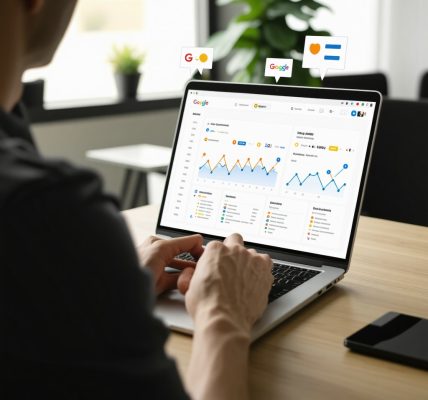Strategic Foundations for Advanced Google Business Keyword Optimization in 2025
In the evolving landscape of local search, crafting a powerful Google Business keyword strategy is no longer a mere option but an essential prerequisite for sustainable growth. As Google refines its algorithms and increasingly prioritizes user intent and hyperlocal relevance, businesses must adopt sophisticated keyword frameworks that transcend traditional practices. Leveraging semantic SEO and data-driven insights enables businesses to capture qualified local traffic and dominate the competitive Google Business ecosystem.
Leveraging Semantic Keyword Clustering to Amplify Local Search Authority
Semantic keyword clustering involves grouping related search terms and phrases that share common intent, thereby optimizing Google Business profiles with a nuanced keyword ecosystem. This approach enhances relevance signals to Google’s local search algorithms, improving visibility across diverse but related queries. For instance, integrating clusters around core service offerings, geographic modifiers, and customer pain points creates a multidimensional keyword matrix that strengthens topical authority and local relevance.
How can businesses identify and implement high-impact keyword clusters for Google Business profiles?
Identifying high-impact clusters requires a blend of AI-powered keyword research tools and manual analysis of customer search behavior. Start by extracting primary keywords from your core business activities, then expand using Latent Semantic Indexing (LSI) tools to discover semantically related terms. Prioritize keywords with strong local intent such as “near me” queries, neighborhood names, and service-specific modifiers. Implement these clusters organically within your Google Business description, posts, and Q&A sections to maximize relevance without risking keyword stuffing.
Harnessing User-Generated Content and Reviews for Keyword Enrichment
Incorporating user-generated content, particularly Google reviews, into your keyword strategy offers a dual advantage: enhancing trustworthiness and organically embedding relevant search phrases. Encouraging customers to mention specific services, locations, and unique selling propositions in their reviews enriches your profile’s semantic footprint. This strategy aligns with Google’s emphasis on authentic, experience-driven content, as corroborated by studies published in the Search Engine Journal.
Prioritizing Update Frequency and Real-Time Keyword Adaptation for Sustained Growth
Google Business profiles that undergo regular updates with fresh keyword-optimized content tend to outperform static listings. Real-time adaptation involves monitoring emerging local search trends and adjusting keyword focus accordingly. Integrating this dynamic approach requires continuous auditing and strategic content refreshes, such as updating business descriptions and leveraging Google’s post feature to reflect timely offers and events. For comprehensive auditing techniques, refer to expert resources on GMB SEO audits.
Integrating Hyperlocal Modifiers and Voice Search Optimization
With voice search becoming ubiquitous, optimizing for conversational, question-based queries is imperative. Hyperlocal modifiers—specific street names, neighborhoods, or landmarks—embedded within your keyword strategy improve chances of capturing voice search traffic. Structuring content to answer common questions, such as “Where is the best coffee shop near me in [Neighborhood]?” aligns with voice search patterns and enhances your Google Business profile’s discoverability.
Contextual CTA: Elevate Your Google Business SEO Today
Unlock the full potential of your local business visibility by mastering advanced keyword strategies tailored for Google Business in 2025. Explore our expert guide on mastering Google Business SEO to deepen your insights and implement proven tactics that drive measurable growth.
Embracing AI-Driven Keyword Insights for Next-Level Google Business Optimization
Artificial Intelligence (AI) has revolutionized keyword research, enabling businesses to uncover nuanced search patterns and user intent that traditional tools often miss. Utilizing AI-powered platforms to analyze large datasets from Google Business interactions can reveal latent keyword opportunities and emerging trends. These insights allow businesses to tailor their profiles with precision, targeting hyper-specific queries that drive qualified local traffic. Combining human expertise with AI-generated data ensures a sophisticated keyword strategy that adapts dynamically to market shifts.
Dynamic Keyword Mapping: Aligning Content with Customer Journey Stages
Successful Google Business keyword optimization now requires mapping keywords to distinct stages of the customer journey. From awareness to consideration and decision-making, each phase demands targeted content and keywords that resonate with user intent. For example, early-stage queries might include broad informational keywords, while later-stage searches focus on specific services or local availability. Strategically embedding these keywords in your Google Business posts, FAQs, and descriptions enhances relevance and conversion potential.
What advanced tools and frameworks can experts utilize to refine keyword strategies for Google’s evolving local search algorithms?
Experts often employ a blend of AI-driven keyword research tools such as SEMrush, Ahrefs, and Google’s own Keyword Planner, supplemented by Google Business Insights for localized analytics. Frameworks like the Keyword Golden Ratio (KGR) help identify low-competition, high-intent keywords ideal for rapid ranking. Additionally, leveraging natural language processing (NLP) to analyze customer reviews and questions can surface conversational keywords aligned with voice search trends. Continuous testing and iterative optimization, supported by these tools, keep strategies aligned with Google’s algorithm updates.
Measuring Keyword Impact through Behavioral Analytics and Conversion Tracking
Beyond visibility metrics, understanding how optimized keywords translate into user actions is critical. Integrating Google Analytics with Google Business profiles allows businesses to track click-through rates, call-to-action engagements, and conversion events directly linked to keyword-driven traffic. Behavioral analytics offer insights into which keywords drive foot traffic, phone inquiries, or online bookings, enabling data-driven refinements. This holistic measurement reinforces the practical value of keyword optimization and guides resource allocation for maximum ROI.
Leveraging Competitive Benchmarking to Adapt Keyword Strategies
Monitoring competitors’ Google Business profiles provides valuable insights into keyword performance within your niche. Tools that analyze competitor keyword rankings and content strategies reveal gaps and opportunities. For instance, identifying underserved local modifiers or service variations used by competitors can inspire keyword diversification. This adaptive approach ensures continuous relevance and competitive advantage in the dynamic local search environment.
Contextual CTA: Discover Cutting-Edge Strategies to Elevate Your Google Business Profile
Stay ahead in the competitive local search landscape by exploring comprehensive tactics in effective GMB ranking strategies. Share your experiences or questions in the comments to foster a community of local SEO excellence.
According to a recent study published by Moz, leveraging AI and behavioral analytics in local SEO significantly enhances keyword relevance and user engagement, leading to higher Google Business ranking and conversion rates (Moz Local SEO Keyword Strategy 2025).
AI-Enhanced Predictive Keyword Analytics: Anticipating Local Search Shifts Before They Happen
In 2025, the frontier of Google Business optimization lies within predictive analytics powered by AI. Unlike reactive keyword strategies, predictive models analyze vast datasets from historical search patterns, competitor movements, and emerging consumer behaviors to forecast which keywords will gain traction in specific locales. This anticipatory approach enables businesses to preemptively adjust their Google Business profiles, capturing demand ahead of competitors and aligning content with upcoming search trends. For example, AI can identify rising search queries tied to seasonal events or new community developments, allowing hyper-targeted keyword integration well before these queries peak.
What role do AI-driven natural language understanding and sentiment analysis play in refining Google Business keyword strategies?
AI-driven natural language understanding (NLU) and sentiment analysis deepen keyword strategy by interpreting the context and emotional tone behind user queries and reviews. NLU helps discern subtle variations in intent, such as distinguishing between informational searches and transactional inquiries, which guides precise keyword selection and content tailoring. Sentiment analysis further reveals customer perceptions and pain points, highlighting keywords that resonate positively or identifying areas needing reputation management. Leveraging these AI capabilities refines semantic keyword clustering and content personalization, resulting in enhanced local search performance and user engagement. This advanced methodology is supported by research from the Association for Computational Linguistics, underscoring the transformative impact of NLU in SEO.
Multimodal Content Integration: Expanding Keyword Presence Beyond Textual Elements
Today’s Google Business profiles are no longer limited to text; integrating multimodal content such as images, videos, and interactive elements presents novel opportunities for keyword optimization. By embedding descriptive alt text, captions, and metadata rich with strategic keywords, businesses can enhance semantic relevance and improve rankings. For instance, videos showcasing local events or service demonstrations tagged with geo-specific keywords align with Google’s preference for diverse, engaging content formats. Additionally, AI-powered image recognition tools analyze visual content for keyword optimization, ensuring that non-textual elements contribute meaningfully to local SEO strategies.
Advanced Schema Markup and Structured Data: Enhancing Keyword Contextualization for Google’s Algorithms
Implementing comprehensive schema markup on Google Business profiles facilitates clearer communication of content context to search engines. Structured data tags such as LocalBusiness, Service, and GeoCoordinates embed keyword-rich information that helps Google disambiguate business offerings and location details. This precision elevates the profile’s eligibility for rich snippets and Knowledge Panel features, thereby increasing click-through rates. Advanced schema strategies include dynamic updates reflecting real-time promotions or service changes, synchronized with keyword shifts detected through ongoing analytics.
Integrating Behavioral Analytics with Keyword Optimization: Beyond Traffic to Tangible Conversions
While traditional SEO metrics focus on impressions and rankings, integrating behavioral analytics uncovers the conversion funnel’s nuances linked to keyword interactions. Heatmaps, session recordings, and user flow analysis reveal how visitors engage with keyword-optimized content, identifying friction points or content gaps. For example, if users frequently exit after reading a keyword-rich FAQ, it signals a need for more compelling calls to action or clearer information. This granular insight drives iterative keyword and content refinement, maximizing the efficacy of Google Business profiles as lead generation tools.
Contextual CTA: Deepen Your Mastery of AI-Driven Local SEO Tactics
Elevate your Google Business SEO by harnessing the synergy of AI, behavioral analytics, and structured data. For a comprehensive exploration of these advanced techniques, explore our in-depth resource on AI-Powered Local SEO Optimization Strategies. Engage with our expert community to share insights and stay at the forefront of evolving local search dynamics.
Deepening Semantic Richness through AI-Powered Contextual Keyword Expansion
Building upon foundational semantic clustering, AI-driven contextual expansion refines keyword ecosystems by analyzing latent contextual relationships across diverse data sources. Leveraging transformer-based language models, businesses can uncover nuanced modifiers and emergent local vernaculars that traditional keyword tools overlook. This granular semantic enrichment empowers Google Business profiles to resonate authentically with hyperlocal audiences, yielding superior algorithmic preference and user engagement.
How can transformer-based AI models transform hyperlocal keyword strategies in Google Business profiles?
Transformer models, such as BERT and GPT, excel in understanding contextual word relationships and disambiguating user intent within complex queries. By applying these models to analyze local search data and customer interactions, businesses extract contextually relevant keywords that align precisely with user expectations and conversational nuances. This enables dynamic keyword adaptation reflecting evolving language trends and locality-specific lexicons. Consequently, Google Business profiles optimized using transformer insights exhibit heightened relevance and improved ranking stability amid algorithmic shifts.
For a comprehensive understanding of transformer NLP applications in semantic SEO, the ACL Anthology’s 2020 research on BERT for Search Relevance offers an authoritative resource.
Augmenting Keyword Strategy with Multimodal AI Analytics: The Future of Local SEO
Integrating AI-driven analysis of visual and textual content—termed multimodal analytics—extends keyword optimization beyond text-centric methods. By interpreting image metadata, video transcripts, and customer-generated multimedia, businesses gain a holistic semantic footprint. This enriched data layer facilitates embedding of contextually appropriate keywords across diverse content types within Google Business profiles, thereby amplifying local search authority and engagement metrics.

Synergizing Behavioral Heatmapping with Dynamic Keyword Refinement
Advanced behavioral heatmapping tools reveal real-time user interaction patterns on Google Business profile elements. When coupled with dynamic keyword refinement algorithms, this synergy enables immediate adjustment of keyword prominence and content hierarchy based on observed engagement metrics. Such responsiveness ensures that keyword strategies remain aligned with evolving consumer behaviors and local search intent fluctuations, maximizing conversion potential.
Leveraging Geospatial AI Insights for Ultra-Targeted Keyword Localization
Geospatial AI analytics harness spatial-temporal data to identify micro-trends in user search behavior linked to specific neighborhoods, transit routes, or community events. Incorporating these insights into Google Business keyword strategies allows for hyper-precise localization, such as promoting service availability during local festivals or tailoring keywords to seasonal foot traffic variations. This level of targeting surpasses traditional geo-modifiers, embedding contextual intelligence that resonates deeply with community dynamics.
Contextual CTA: Propel Your Google Business Profile into the AI-Enhanced SEO Era
Embrace the forefront of local SEO innovation by integrating transformer-based NLP, multimodal AI analytics, and geospatial insights into your Google Business keyword strategy. Discover advanced methodologies and case studies by visiting our exclusive resource on AI-Driven Google Business Optimization. Join our expert forum to exchange strategies and elevate your local search dominance.
Expert Insights & Advanced Considerations
Integrating AI-Powered Semantic Analysis for Hyperlocal Relevance
Harnessing transformer-based AI models such as BERT and GPT enables a granular understanding of nuanced local search intent. By leveraging these technologies, businesses can enrich their Google Business keyword strategies with contextually precise and evolving vernaculars that traditional keyword tools often overlook. This approach not only boosts algorithmic favorability but also enhances authentic resonance with hyperlocal audiences, driving sustained engagement.
Dynamic Keyword Refinement Through Behavioral Analytics
Real-time behavioral data, including heatmaps and user flow analysis on Google Business profiles, offers invaluable insights into how visitors interact with keyword-optimized elements. Employing dynamic keyword refinement algorithms that respond to these behavioral patterns ensures that keyword prominence and content structure remain aligned with consumer intent fluctuations, optimizing conversion potential and local search performance.
Leveraging Multimodal Content for Keyword Expansion Beyond Text
Expanding keyword optimization to include multimedia content such as images and videos, enriched with strategically crafted metadata and captions, creates a multifaceted semantic footprint. AI-driven analysis of this multimodal content uncovers latent keyword opportunities and strengthens local search authority by meeting Google’s preference for diverse and engaging content formats.
Predictive AI Analytics for Anticipating Local Search Trends
Predictive models powered by AI can forecast emerging local keyword trends by analyzing historical data, competitor activity, and community events. This foresight enables proactive optimization of Google Business profiles, allowing businesses to capture demand ahead of competitors and align their keyword strategies with anticipated search behaviors, particularly around seasonal or hyperlocal phenomena.
Advanced Schema Markup to Enhance Keyword Contextualization
Implementing comprehensive structured data such as LocalBusiness and GeoCoordinates schema enriches Google’s understanding of your business context and offerings. When integrated with keyword optimization, this advanced markup increases eligibility for rich snippets and Knowledge Panel features, significantly improving visibility and click-through rates in local search results.
Curated Expert Resources
Ranking SEO GMB Comprehensive Guides: The suite of resources at Mastering Google Business SEO and GMB SEO Audit offers in-depth frameworks and actionable techniques essential for mastering advanced Google Business keyword strategies.
Association for Computational Linguistics (ACL Anthology): Their authoritative research on transformer NLP applications, such as the 2020 BERT for Search Relevance paper, provides critical insights into AI-driven semantic SEO innovations.
Moz Local SEO Keyword Strategy 2025: This study (Moz Local SEO Keyword Strategy 2025) delivers data-backed analysis on leveraging AI and behavioral analytics to enhance keyword relevance and local user engagement effectively.
Search Engine Journal Local SEO Section: Regularly updated expert articles like Google My Business Optimization provide practical and current strategies for integrating user-generated content and optimizing for voice search.
Ranking SEO GMB AI-Driven Optimization Resources: Explore advanced methodologies and case studies at AI-Driven Google Business Optimization to stay at the forefront of local SEO innovation.
Final Expert Perspective
Mastering Google Business keyword strategy in 2025 demands a sophisticated blend of AI-driven semantic analysis, dynamic behavioral insights, and multimodal content integration. The shift towards predictive analytics and advanced schema markup redefines how local businesses can anticipate and meet evolving search intents, ensuring superior visibility and engagement. By embracing these cutting-edge approaches, professionals can secure a decisive competitive advantage within the Google Business ecosystem.
For those ready to elevate their expertise further, engaging with comprehensive resources like effective GMB ranking strategies and participating in expert communities fosters continual growth and innovation. Share your advanced insights or challenges in implementing these strategies at our contact page, and collaborate with leading experts to refine your local SEO mastery.




The article’s emphasis on semantic keyword clustering really resonates with what I’ve seen working in local SEO lately. Grouping related terms by intent rather than just slapping on as many keywords as possible seems to be the way Google wants us to approach optimization now. I’ve experimented with integrating hyperlocal modifiers, like specific neighborhoods and landmarks, into Google Business descriptions and posts, and it actually improved visibility in location-based searches. The challenge I face is balancing rich keyword inclusion without making the listing seem keyword-stuffed or unnatural—especially in customer reviews. Encouraging clients to mention specific services naturally without pushing them feels like walking a fine line. Also, the dynamic adaptation to local search trends through continuous auditing mentioned here is something I feel more businesses need to adopt but struggle with due to resource constraints. Has anyone found effective tools or strategies to streamline these ongoing audits and real-time keyword updates, especially for small businesses without dedicated SEO teams? It would be great to hear about experiences or recommendations on managing this continuous optimization to keep profiles competitive in evolving local search landscapes.